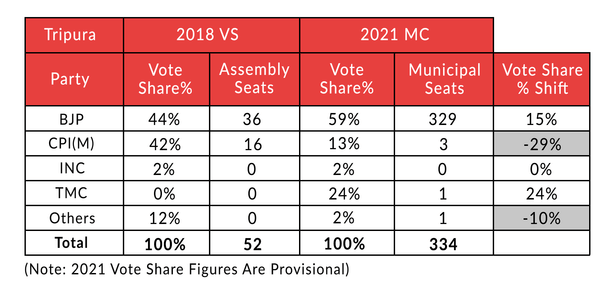Politics
Tripura Municipal Polls: What A Cautious Comparison With 2018 Assembly Election Numbers Tells Us
Venu Gopal Narayanan
Nov 29, 2021, 04:21 PM | Updated 05:27 PM IST
Save & read from anywhere!
Bookmark stories for easy access on any device or the Swarajya app.


The Bharatiya Janata Party’s (BJP) stupendous performance under the stewardship of Chief Minister Biplab Kumar Deb, in Tripura’s municipal elections, and the national euphoria that win evoked among its supporters, both exceeded expectations by a fair bit.
Numerically, the BJP won 329 of 334 urban seats, or 99 per cent of the seats on offer, across 13 Municipal Councils, six Nagar Panchayats, and the prize – Agartala Municipal Corporation (AMC; where they swept all 51 seats). The combined opposition won only five seats: the Marxists (CPIM) won three, the Trinamool Congress (TMC) one, and Tipraha Indigenous Progressive Regional Alliance (TIPRA), a local party, one.
The vote shares distribution was just as lopsided: the BJP received a full 59 per cent of the popular urban vote, the TMC 24 per cent, and the CPIM around 13 per cent.
We can’t make a direct apples-to-apples comparison between these municipal elections and the 2018 assembly elections (which the BJP won surprisingly and handsomely by coming out of nowhere), because of the urban-rural skew (Tripura is only 26 per cent urbanised as per the last census), the final numbers aren’t out yet, and because people vote differently in local, state and national elections.
Consequently, the performance of a local party like the Indigenous Peoples Front of Tripura (IPFT), for example, which won 7 per cent of the votes and eight seats in the 2018 assembly elections, in largely rural, tribal-dominated areas, wouldn’t really come into play in these urban elections.
Nonetheless, the scale of the swing to the BJP, and the TMC, provides us with clear trend-shifts which may be analysed.

In 2018, the BJP’s remarkable surge was because of a block shift of Congress votes to them, with the Communists’ vote base remaining largely intact. In 2021, it appears that the BJP has attracted 5 per cent of the Communist vote and 10 per cent from others, to increase its vote base in urban areas by a remarkable 15 per cent.
The TMC, which was nowhere in 2018, now commands a quarter of the urban votes, almost all of which have come from the Communists. That has brought the Communists down to around 13 per cent; they are finished in Tripura for all practical purposes, since a number of the contests in rural areas, in 2018, were between the BJP and the IPFT.
Thus we see that Congress was decimated by the BJP in 2018 and the CPIM by the TMC in 2021. This marks the passing of a long age in Tripura politics, and the advent of a new one, with ramifications at the national level.
For the TMC, this certainly boosts their ongoing efforts to become a national party, but these dreams have severe limitations, since size matters in politics; Tripura, like Meghalaya or Goa, where the party seems to be making waves through PR campaigns and defections, is not Tamil Nadu, Uttar Pradesh or Maharashtra, for example, where the TMC would be hard-pressed to win a solitary seat on their own in the foreseeable few years.
For the Communists, it is the end of a long and sordid road. All they have left now is Kerala, and even there, it is only a matter of time before a national mood of supra-caste consolidation sweeps Marx’s spawn into the Arabian Sea.
For the Congress, the Tripura results are one more reason why they should realize that their real opposition is not the BJP anymore, but other opposition parties. In state after state, they are gradually being replaced by non-BJP forces, and not all the shenanigans and theatrics of Hathras or Dadri will put Humpty together back again.
For the BJP, these corporation results are a vindication of the visible primacy they have given to the North East since 2014, in general, and of the state unit’s performance in particular. Mainstream media had been mercilessly quick in 2018, to portray Deb as a newbie, but after three years of hard work in government, and at the grassroots, it is the Chief Minister of Tripura who is having the last laugh.
Venu Gopal Narayanan is an independent upstream petroleum consultant who focuses on energy, geopolitics, current affairs and electoral arithmetic. He tweets at @ideorogue.





